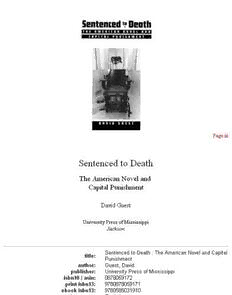
Sentenced to death: the American novel and capital punishment PDF
01997·0.368 MB·English
Most books are stored in the elastic cloud where traffic is expensive. For this reason, we have a limit on daily download.
Preview Sentenced to death: the American novel and capital punishment
Description:
The criminal justice system in America is as powerful a shaper of history and society as its better-known counterparts--the military, politics, government, and technology. In a country that lacks a mandatory death sentence for specific crimes, the American strategy for execution proves to be based more upon distinctions between offenders than upon distinctions between offenses.Five important novels--McTeague, An American Tragedy, Native Son, In Cold Blood and The Executioner's Song--bring readers a vivid awareness of America's punitive codes. Each details the story of a life that leads to the gallows. Sentenced to Death places these works against the historical background of crime and capital punishment in America, a nation where public discourse on crime is dominated by images of the electric chair and the gas chamber, by maximum security prisons, by hardened convicts out on parole. Such images, in turn mirror and shape the exercise of punitive power.This probing look at capital punishment in execution novels and in real-life media accents the poles of punitive power. Such a comparison of literary works with confrontational journalism and court records also brings revealing insight into the long-term debate on capital punishment in American culture.
See more
The list of books you might like
Most books are stored in the elastic cloud where traffic is expensive. For this reason, we have a limit on daily download.
